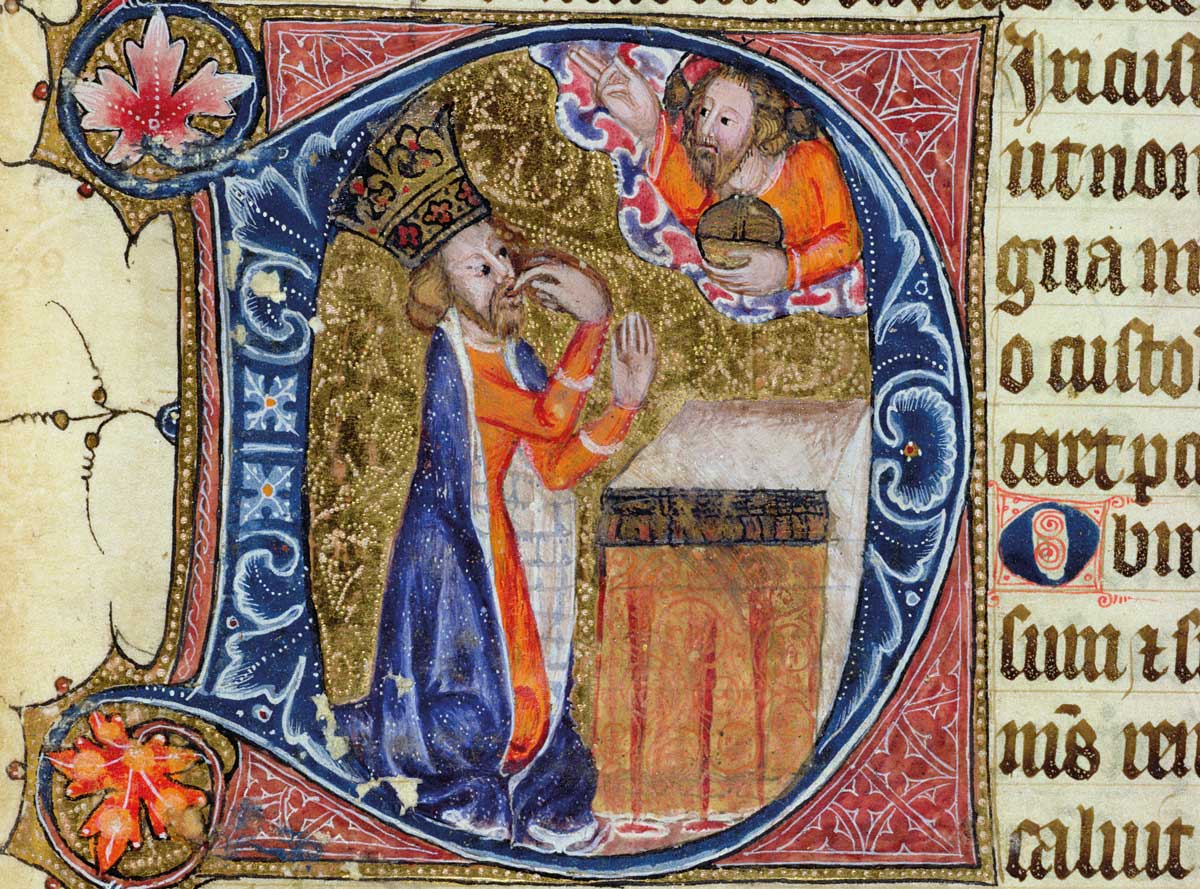cultură şi spiritualitate
History is often advanced by chance encounters, a rare luxury in our current condition.
 King David in an illustration for Psalm 38, from the Ramsey Abbey Psalter, c.1380 © Bridgeman Images.
King David in an illustration for Psalm 38, from the Ramsey Abbey Psalter, c.1380 © Bridgeman Images.One aspect of life which has been radically curtailed this year has been the chance encounter. When everyone is trying to limit their contact with other people, all kinds of passing interactions have become necessarily brief and often fraught. Now that every activity requires a register or a link to a scheduled online meeting, the opportunities for spontaneous conversation and casual mingling are much reduced.
They will return one day, we must hope. It would be hard to live forever in a world without serendipity and chance meetings: moments of unexpected connection between friends, colleagues, or strangers, which no one would think to plan for, but which can add so much to daily life. Such meetings are not always inconsequential. History has been made by chance encounters: they have sparked revolutions, birthed dynasties, fostered scientific and intellectual progress through the meeting of like minds. The conversation of a brief moment may echo through centuries.
Here’s the story of one such meeting from tenth-century England, which laid the foundations for a centre of scholarship that lasted for hundreds of years. In the spring of 965, the leading men and women in England were gathered in Glastonbury for a funeral, attended by the king and many dignitaries. After the funeral, two of the guests got talking. They were Oswald, Bishop of Worcester, and Æthelwine, Ealdorman of East Anglia. Oswald was a young and rising bishop, who managed to be both the grandson of a Viking and the nephew of the Archbishop of Canterbury (a combination no one else has ever managed). Æthelwine was a wealthy landowner, from a family with royal connections.
What they had in common, as they discovered when they met at the funeral, was an interest in founding a monastery. Oswald had a small group of monks for whom he was seeking a home; Æthelwine had land. The result of their conversation was that they agreed to establish an abbey at Ramsey, an island in the Fens close to Æthelwine’s estates.
Under its energetic patrons, Ramsey Abbey was soon founded and began to flourish. Oswald had been educated at the great Benedictine abbey of Fleury, one of the most celebrated monasteries of the day and an influential centre of learning, and he was keen to bring the fruits of his foreign education to revitalise the English church. He wanted to make Ramsey a kind of English Fleury: he dedicated the abbey to St Benedict, helped it to amass a large library and arranged to import the renowned scholar Abbo of Fleury to teach the monks. Abbo brought with him the most up-to-date learning on many aspects of monastic scholarship and his time at Ramsey left a lasting influence on Anglo-Saxon science and history writing. Among the scholars he taught was a young monk named Byrhtferth, who grew up to be the author of several important works of English history.
After these hopeful beginnings, Ramsey remained an intellectual and economic powerhouse until the Dissolution of the Monasteries. It continued to be distinguished by the quality and size of its library, which included a notable collection of books in Hebrew. Among the losses suffered by monastic libraries at the Dissolution, Ramsey’s is one of the saddest to contemplate. According to its medieval catalogue, for instance, the abbey once owned around 100 manuscripts of the Psalter; three survive. From the original Anglo-Saxon library built up in the time of Oswald, only a handful of books can now be identified.
Almost nothing visible survives of Ramsey Abbey – just a ruined medieval gatehouse and the infirmary, which was converted into a parish church. The abbey’s own church would once have been fine enough to rival the cathedrals boasted by its neighbours, Ely and Peterborough, but it was entirely destroyed, some of its stone carried off to build Cambridge colleges.
But nearly 600 years of spiritual and intellectual community was not a bad run for Oswald and Æthelwine’s joint project. In the early days of Ramsey, its two founders maintained a close relationship with their abbey. Both died in the same year, 992, and their deaths were deeply felt: beforehand a monk of Ramsey had a vision of the two towers of the church collapsing, a premonition of the loss of the abbey’s twin supporters. That was almost 30 years after their encounter at the funeral. Their chance conversation had led to a life-long collaboration and a legacy which outlived them both, bearing fruit for generations of scholars.
Eleanor Parker is Lecturer in Medieval English Literature at Brasenose College, Oxford and writes a blog at aclerkofoxford.blogspot.co.uk.
Adaugă un comentariu
© 2024 Created by altmarius.
Oferit de
![]()
Embleme | Raportare eroare | Termeni de utilizare a serviciilor













Pentru a putea adăuga comentarii trebuie să fii membru al altmarius !
Alătură-te reţelei altmarius